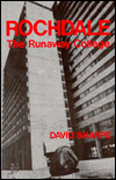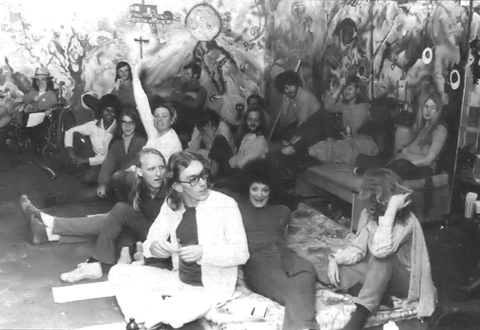At Rochdale College in Toronto, the students were in charge. It survived for only seven years, but it ended as a controversial symbol of the flower-child Sixties.
Rochdale: The Runaway College, a social history by David G. Sharpe, Assistant Professor in the Department of English, has been issued as an eBook by Toronto’s Anansi Press.
“The largest free university on the continent, Rochdale College in Toronto developed from the same ingredients found on our campus today—students wanting control over their own education, and students testing the rowdy powers of liberation. The difference is one of scale only. If one of the residence halls at Ohio University suddenly became owned and operated entirely by students, what kind of press would show up in The Athens News? Would the student-run venture become a national story lasting seven years?” Sharpe asks.
In Rochdale College, students became owners of a $6 million, 18-story residence by walking through the door. Students had complete self-government with their own police force, court, even their own monarchy. They organized classes, communes, businesses. Some of them organized drug-dealing. What happens when academic and social freedom are taken to the breaking point? From 1968 to 1975, Rochdale College became a fortress in the middle of a city, a target of police invasions and mass evictions, and a symbol of a decade and a generation.
 This story of Rochdale, first published in 1987, looks at a slice of youth when they are at an age as turbulent now as in the 1960s. The turmoil and the outcomes are narrated and studied by David G Sharpe, who is a graduate of those times. Anansi Press, publisher for Margaret Atwood, Michael Ondaatje, and Northrop Frye, began in Rochdale College and chose this book as its definitive history.
This story of Rochdale, first published in 1987, looks at a slice of youth when they are at an age as turbulent now as in the 1960s. The turmoil and the outcomes are narrated and studied by David G Sharpe, who is a graduate of those times. Anansi Press, publisher for Margaret Atwood, Michael Ondaatje, and Northrop Frye, began in Rochdale College and chose this book as its definitive history.
From the Book Cover
Toronto’s Rochdale College began as an experiment in living and learning, and ended as a symbol of the flower-child Sixties, a financial and social controversy. David Sharpe now tells the fascinating story of the college’s seven year rise and fall in this entertaining and well-researched book.
Sharpe examines the contradictions of the Age of Aquarius squeezed into one stark skyscraper on Bloor Street. He looks at the financing and the internal government of the college, as well as its creative achievements over the years and its contribution to the community. For the first time, Rochdale: The Runaway College provides us with a balanced, detailed picture of the day to day life of the college residents: the peace parties and joyful live-ins, as well as the police raids and the drug overdoses of the dark days.
From Chapter 5: The Changeling
If the new residents were a problem to the resource people, non-residents were a problem to everyone. As Rochdalians claimed floor by floor in the fall of 1968, transients discovered wide open areas on the upper floors and moved in—and out and in and out. As those areas became permanently occupied, the transients continued to wander and squat and wander again. Meanwhile, word of mouth, word of press, called out: A free college! A college so unlicensed that it offers, not freedom or license, but both. Freedom from parents, freedom from rent, freedom even from an address. Like a crowd to an accident, thousands of visitors and interim residents came from the roads and the suburbs.
Metro had a little school
Its name was black as sin
And day and night the Metro kids
Were screaming to get in.
From Chapter 14: Under the Rock
As Rochdale the Drug Store moved its merchandise, Rochdale the College stabilized into a school that a school marm would have difficulty recognizing. The first step was already well-advanced—the rejection of academic and disinterested learning. University of Toronto professor Elliot Rose styled education in Rochdale as “survival training in [an] up-from-anarchy situation,” while resident Jack Jones pointed to the advantages of Rochdale as “an educational junkyard, an un-learning situation.” The Daily Planet [the college newspaper] praised “the slow striptease of our concepts, it is even this which builds us.”





















Comments